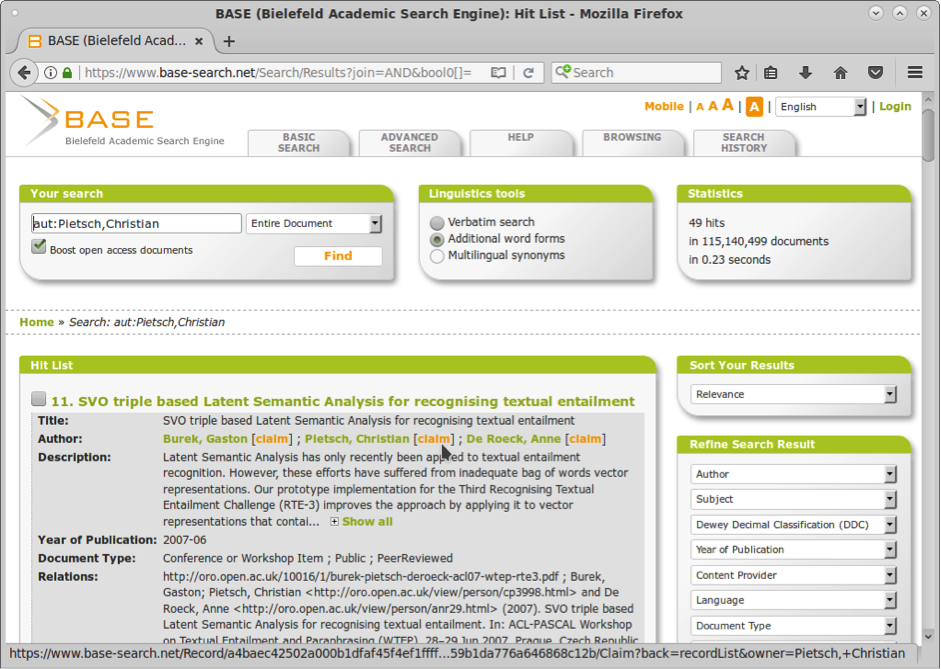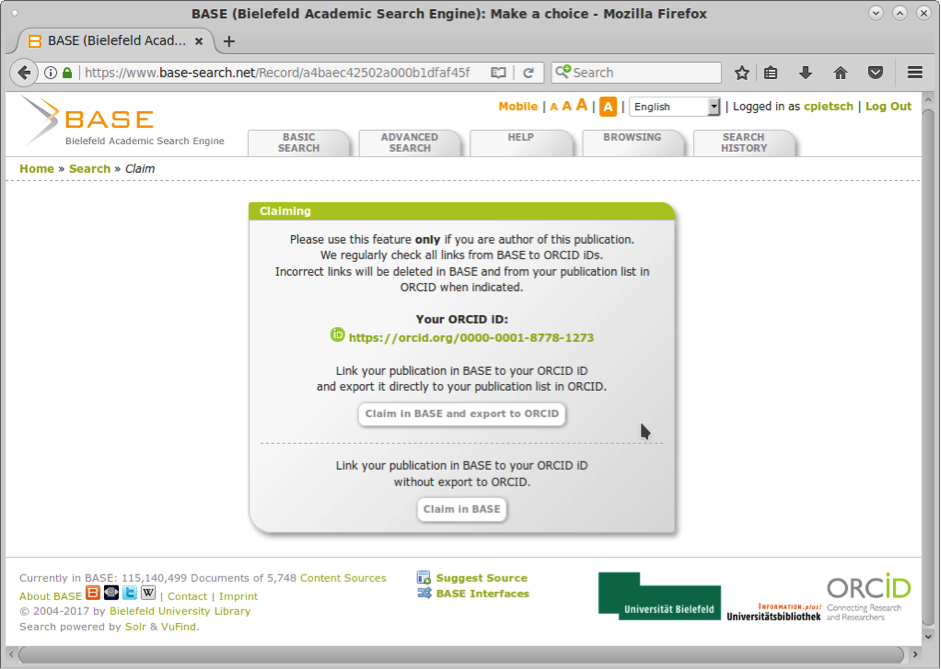You may not have heard of it, but BASE (Bielefeld Academic Search Engine) is one of the world’s largest academic search engines – indexing more than 100 million documents. It has been developed and is run by Bielefeld University Library in Germany. Several things are special about this search engine. First, it does not crawl the web. Instead, it harvests institutional repositories and journals via a more precise standard protocol called OAI-PMH. Second, it is non-commercial, free to use, ad-free and transparent: information about its index size and regional coverage are readily available. Third, it favours open access: results with freely available full text are listed first by default.
To make its output even more useful and reliable, BASE has recently integrated with ORCID, so that users can now easily associate their own publications in BASE with their ORCID iD. In future, a search for an author by ORCID iD in BASE will return results only by that author and not by anybody else who happens to bear the same name – including documents published under the author’s other names and name variations.
The ORCID DE project, funded by the Deutsche Forschungsgemeinschaft (DFG, German Research Foundation), aims to promote and establish ORCID throughout Germany as a unique identifier for researchers at universities and non-university research institutions.
Dirk Pieper, deputy director of Bielefeld University Library, says: “The usage of truly global identifiers is crucially important for the ever growing academic publication system. By integrating ORCID into BASE, we reached a major milestone for the ORCID DE project and made a big step in the further development of BASE as a leading publication data hub. With this integration we hope to support the dissemination of ORCID in the open access and repository communities worldwide.”
Roland Bertelmann, Head of Library and Information Services at the Helmholtz Centre Potsdam GFZ German Research Centre for Geosciences, states: “The integration of ORCID into BASE is of the utmost importance to the ORCID DE project, as we reach a major milestone and at the same time bring together ORCID and the largest search engine of open access resources.”
The BASE Search & Link Wizard, Step by Step
 Searching for an author name in BASE can return documents by people who happen to bear the same name – as in this case
Searching for an author name in BASE can return documents by people who happen to bear the same name – as in this case
 On the second page of results, I find one of my own publications and click [claim]
On the second page of results, I find one of my own publications and click [claim]
 Unless I am already logged into BASE, I am now asked to login or register with BASE
Unless I am already logged into BASE, I am now asked to login or register with BASE
 Now I can associate this document with my ORCID iD – either just in BASE or both in BASE and ORCID
Now I can associate this document with my ORCID iD – either just in BASE or both in BASE and ORCID
The ORCID/BASE integration, launched today in beta, is a big step forwards, and we warmly invite community feedback from users of both BASE and ORCID.
“The ORCID integration into BASE provides researchers a means to easily connect to their work and distinguish their contributions from others with the same name – or through name changes a researcher may have undergone in their career. We are pleased to have been able to support German researchers through the BASE integration project and the ongoing ORCID DE project, “ said Laurel Haak, Executive Director of ORCID.
We are delighted to report that ORCID adoption in Germany continues to grow, with well over 100,000 ORCID registrants. ORCID DE has other major objectives: linking the Integrated Authority File (GND) and ORCID, and continuing promotion of the ORCID Germany consortium.
Join us on 7 September 2017 for our second German national workshop, hosted by ORCID DE and ORCID. The event will take place in Frankfurt am Main and will focus on the process and challenges of the technical integration of ORCID into publication and research information systems.